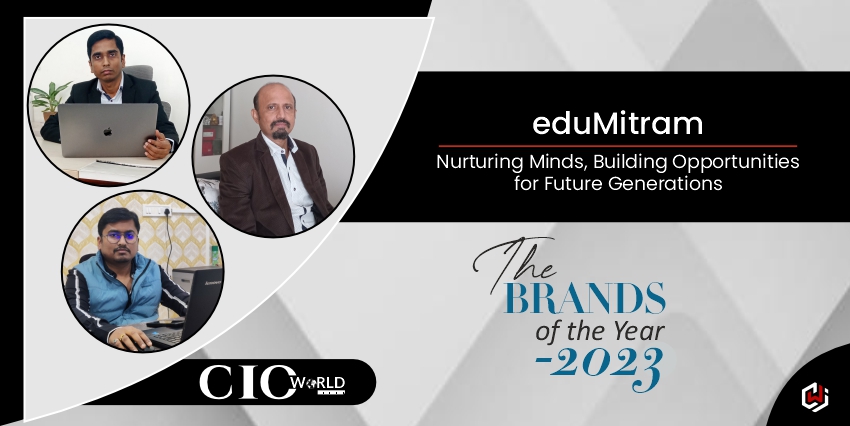India is a nation striving to bridge the gap between traditional and modern education. Traditional systems fall short, pushing learners toward online platforms. This is where eduMitram comes into the spotlight while offering a lifeline and transforming education into an accessible reality. In the landscape of education technology, eduMitram is a pioneering learning solutions provider in India, adopting cutting-edge technologies like cloud computing, big data and learning analytics.
The Director and Co-founder of eduMitram—Prem Ranjan, is a trailblazer in the realm of learning solutions harnessing education technology to its fullest. He is a dynamic entrepreneur wielding an MBA and holds a rich experience in marketing and management.
The Technical Architect of eduMitram – Prabhat is having more than fifteen years of experience in architecting and developing market leading products. Prabhat evolves quickly with the latest technologies. With his expertise on web, mobile, backend and cloud. he is driving the tech team of eduMitram
Alongside Prem, Prabhat, The Director of eduMitram Ashirvadam holds more than two decades of experience in software engineering. He possesses strong interpersonal skills and keeps a positive attitude. He developed SmartClass – a world-class comprehensive technology-enabled teaching solution for schools. Ashirvadam is a transformative force redefining how we perceive education in the digital age.
Under their coherent leadership, eduMitram is a leading learning solution provider company in India, striving to enhance the traditional education system with the modern educational system by adopting the latest educational technologies.
With a focused mission, eduMitram reshapes the educational narrative. At its core, eduMitram believes in empowering partners—schools, teachers, students, and parents—offering solutions that are not just tools but companions in the educational journey and building an ecosystem where education meets accessibility.
Let’s delve into innovative approaches and a dedication to progress; Ashirvadam and eduMitram usher in a new era of education in India!
Innovator’s Footprints
Ashirvadam embarked on a remarkable journey, transitioning from an employee to an entrepreneur during the COVID-19 pandemic. With over two decades of experience in the ed-tech industry, he observed a significant gap between industry requirements and the quality of work being delivered. “There are so many great ideas out there, but the lack of proper tech support hinders their implementation,” Ashirvadam notes.
Driven by this realization, Ashiravadam and his team set out on a mission to provide top-notch and cost-effective e-learning solutions. Their approach involves cutting-edge technology and brilliant minds. Over the last two years, they’ve successfully completed numerous substantial projects in education, security, licensing, CRM, Android, iOS, and web app development.
eduMitram has played a pivotal role in assisting major companies to adapt to new education policies. This transformation is made possible by their team of content creators, subject matter experts and the latest technology.
From Vision to Victory
Ashirvadam’s guiding philosophy for success revolves around “constant innovation and out-of-the-box thinking.” In an ever-evolving market, he emphasizes the significance of a shared vision that benefits all stakeholders, including “customers, employees, partners, and communities.” With this ethos, they are committed to delivering more tech solutions to shape a brighter future.
Innovate to Elevate
“In the fast-paced and ever-evolving world of business, the only constant is change,” observes Prem. He highlights the importance of adaptability, stating that it’s not just a valuable skill but a “crucial mindset” that can shape an organization’s destiny. In a landscape marked by technological advancements, economic fluctuations and changing consumer preferences, embracing change is the key to success.
Ashirvadam advocates for a strategic approach that meticulously balances “functional efficiency and customer satisfaction.” His insights provide a roadmap for IT companies, emphasizing the significance of:
- Understand customer needs, engaging in regular feedback sessions to comprehend pain points and priorities.
- Implement agile methodologies, ensuring project management is efficient and is completed on time, within budget and with a focus on quality.
- Employ rigorous testing procedures encompassing functional, usability and security aspects to ensure reliability.
- Prioritize intuitive and user-friendly designs through user testing and feedback sessions.
- Cultivate a culture of ongoing enhancement, making data-driven decisions to boost efficiency.
- Invest in employee training for a skilled and knowledgeable team capable of delivering high-quality solutions.
- Maintain clear communication internally and externally to manage expectations effectively. Set realistic expectations with transparent communication about IT solutions’ capabilities and limitations.
- Provide responsive customer support for quick issue resolution, enhancing satisfaction.
- Offer regular software updates addressing bugs, security and evolving customer needs.
- Prioritize data security and compliance with relevant regulations, assuring customers of their data’s safety.
- Tailor solutions to individual needs, enhancing customer satisfaction significantly.
- Define and measure KPIs related to functional efficiency and customer satisfaction for continuous improvement.
- Actively seek customer feedback through surveys and interviews to drive solution improvements.
- Develop solutions that can scale and adapt to changing requirements, ensuring long-term relevance.
Prabhat’s approach accentuates the essential synergy between technological prowess and customer-centricity, a combination vital for thriving in the dynamic IT landscape.
Code and Conquer
Today, in the realm of the digital age where the change is constant to ensure efficiency by harnessing technology, Prabhat’s approach to software development highlights the necessity of technological innovation. His insights guide companies to remain at the forefront of the industry by optimizing services through technology:
- Staying current with the latest industry trends is imperative, as Prabhat advises, to “leverage technology to optimize services.”
- Agile methodologies offer flexibility and continuous improvement. They accelerate software development and enhance project management.
- Automating routine tasks like testing and code integration saves time and minimizes errors, as Prabhat notes.
- Implementing Continuous Integration/Continuous Deployment (CI/CD) pipelines streamlines software releases, ensuring quick and reliable delivery.
- Utilize cloud platforms for scalability, cost-efficiency and global reach.
- Adopt DevOps principles to streamline software delivery and enhance quality through collaboration.
- Leverage data analytics to make informed decisions based on user behavior and software performance insights.
- Prabhat emphasizes robust security practices, regular assessments and penetration testing to protect against cyber threats.
- Prioritize user-friendly designs, conduct user testing and incorporate feedback to enhance satisfaction.
- Develop mobile platforms and implement responsive design for a seamless user experience.
- When appropriate, utilize open-source software for cost savings and collaboration opportunities.
- Design software to handle increased workloads as the customer base grows, ensuring consistent performance.
- Enable third-party integration through APIs to cater to diverse customer needs and extend software functionality.
Prabhat’s approach places technology at the core of software optimization ensuring that companies remain adaptable and competitive in the digital era.
From Potential to Performance
Ashirvadam advocates a people-centric approach in the workplace emphasizing the significance of continuous learning and growth. According to him, nurturing a skilled workforce involves several key strategies:
- Continuous Learning Programs: Ashirvadam advises, “Offer a variety of training programs and certifications to enhance technical skills.” This ensures employees stay updated with industry trends.
- Mentorship Initiatives: Establish mentorship programs, allowing experienced colleagues to guide newcomers. Ashirvadam notes, “Mentorship accelerates skill development and integrates employees into company culture.”
- Clear Career Paths: Define clear career progression routes, offering employees a roadmap for advancement.
- Constructive Performance Reviews: Regular reviews with “clear objectives for skill development” provide valuable feedback. Exceptional achievements should be recognized and rewarded, Prabhat
- Empowerment and Autonomy: Empower employees by allowing them to make decisions within their roles. “Encourage a culture where ideas are valued and initiative is appreciated,” Ashirvadam
- Innovation Time: Dedicate time for innovative projects and knowledge sharing. Prabhat advocates for a collaborative environment, facilitated through cross-functional teams and regular knowledge-sharing sessions.
- Recognition and Rewards: Acknowledge employee contributions through monetary incentives and non-monetary recognition programs. Ashirvadam emphasizes the importance of appreciating skills and dedication.
- Flexible Work Arrangements: Offer flexibility, including remote work options, accommodating diverse learning and work styles. According to Ashirvadam, this flexibility fosters a supportive environment for continuous learning.
Redefining Branding
Prem emphasizes the pivotal role of new-age branding techniques in enhancing the end-user experience when conversating about the digital age influence in terms of branding. According to him:
- Active Social Media Presence: “Maintain a presence on major platforms,” Prem advises, using LinkedIn, Twitter and industry-specific networks to engage with customers and build a community around the brand.
- Content Marketing: Creating valuable content like blog posts and webinars positions the company as an industry authority, educating and engaging the audience simultaneously.
- Search Engine Optimization (SEO): “Optimize online content to ensure easy accessibility,” says Prem. SEO ensures potential clients find relevant information about the company’s services effortlessly.
- User-Centered Design: Prioritize user-friendly interfaces by incorporating feedback from testing sessions, ensuring intuitive software and websites.
- Data Analytics: Utilize data analytics to comprehend user behavior, inform strategies and improve the user experience.
- Personalization: Tailor software interfaces and communications to individual preferences enhancing user engagement and satisfaction.
- Customer Feedback Loop: “Establish a feedback loop,” Prem suggests, enabling continuous improvements based on user insights.
- Mobile Responsiveness: Ensure seamless access across devices. Mobile responsiveness is key to a smooth user experience.
- Cybersecurity and Data Privacy: Prioritize robust cybersecurity to maintain trust in digital interactions, especially in the IT industry. This focus on digital safety ensures user data is safeguarded, enhancing user confidence in the brand’s digital presence.
Beyond Limits
Ashirvadam envisions a company that stands as an embodiment of excellence transcending all quality parameters. He articulates their mission with clarity: “Our Vision is to be a nationally and globally valued company that delivers the most excellent and reliable e-learning solutions employing state-of-the-art technology and the most intelligent mind.”
With a resolute aim, they aspire to lead the market with a global presence by 2030. Ashirvadam emphasizes their commitment to bridging educational disparities: “Our first motive is to make education accessible for the last layer of society.”
Recognizing the challenges faced by many students in rural India, they leverage digital advancements and data accessibility to bring quality education within reach for all, “with the collaboration of our Stakeholders.” This vision reflects a dedication to equity and innovation in the ever-evolving landscape of education.





